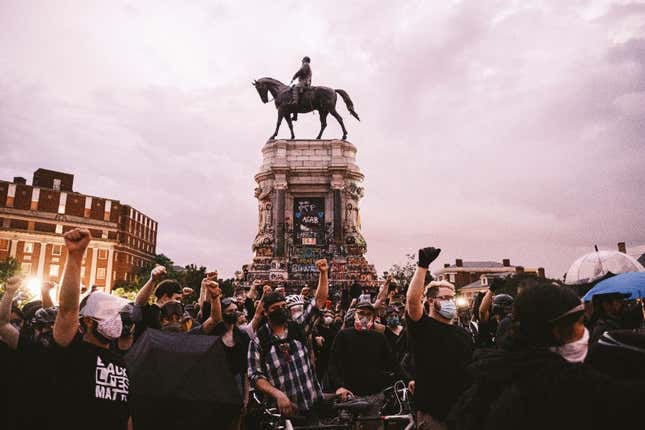
2020 has been quite the year for a soldier of white supremacy who’s been dead for just over 150 years.
It’s been nearly 5 months since Virginia Gov. Ralph Northam declared that “Richmond is no longer the capital of the Confederacy” and announced plans to remove the city’s iconic statue of Confederate General Robert E. Lee along with other monuments to people who are rolling over in their graves knowing Black people are allowed to just walk around free these days.
Four days after Northam made his announcement, Richmond Circuit Judge Bradley B. Cavedo granted a temporary injunction barring the state of Virginia from removing the Lee statue after descendants of Lee sued to keep their family legacy of keeping negroes in chains alive. A short time later, Cavedo decided to extend the injunction because other Virginians sued on behalf of their love for their giant ode-to-racism bust.
Well now, it’s a new day, a new circuit judge, and a new ruling as Judge W. Reilly Marchant ruled Tuesday that Northam can remove the 130-year-old eyesore to anyone who believes Black people’s other two-fifths of humanity should be properly recognized.
The Washington Post reports that Marchant decided that Virginia isn’t obligated to honor covenants dating back to 1870 and 1890 in which the state agreed to protect the Lee statue forever—the basis on which Richmond citizens sued to keep their freedom fighter for slavery immortalized. The century-plus-old agreements are also why another 90-day injunction was issued in August, according to Patch.
“The Virginia Supreme Court has long held that in order to enforce deed restrictive covenants, such enforcement must not be contrary to public policy, nor should conditions have so radically changed as to practically destroy the original purposes of the covenant,” Marchant wrote in his ruling.
From the Post:
In his order, Marchant recounted testimony from historians Ed Ayers and Kevin Gaines, who appeared as expert witnesses for the state at the one-day trial on Oct. 19.
“Their testimony described a post-war South where the white citizenry wanted to impose and state unapologetically their continued belief in the validity and honor of their ‘Lost Cause,’ and thereby vindicate their way of life and their former Confederacy,” Marchant wrote. “It was out of this backdrop that the erection of the Lee Monument took place.”
Marchant noted that Gaines also testified that “today the monument stands as a contradiction to present societal values.”
“The Lee monument was built to celebrate the Confederacy and uphold white supremacy,” Northam said in a statement after Tuesday’s ruling, the Post reports. “This victory moves Virginia forward in removing this relic of the past—one that was erected for all the wrong reasons.”
Northam and other Virginians who wish to see monuments to chattel slavery protectors reduced to rubble—or at least removed from Richmond’s Monument Avenue—shouldn’t start celebrating too soon because Marchant’s ruling also prohibits the governor from immediately moving to take the statue down giving those who wish to keep their shrine to humans who owned other humans time to appeal the ruling.
Lawyer Patrick McSweeney, the attorney representing Virginians who think the pilar of oppression should stay put, confirmed plans to appeal Marchant’s ruling saying “Obviously we think he got it wrong.”
According to the Post, people who like their fighters for systemic racism canonized have 30 days to file a notice of appeal.

